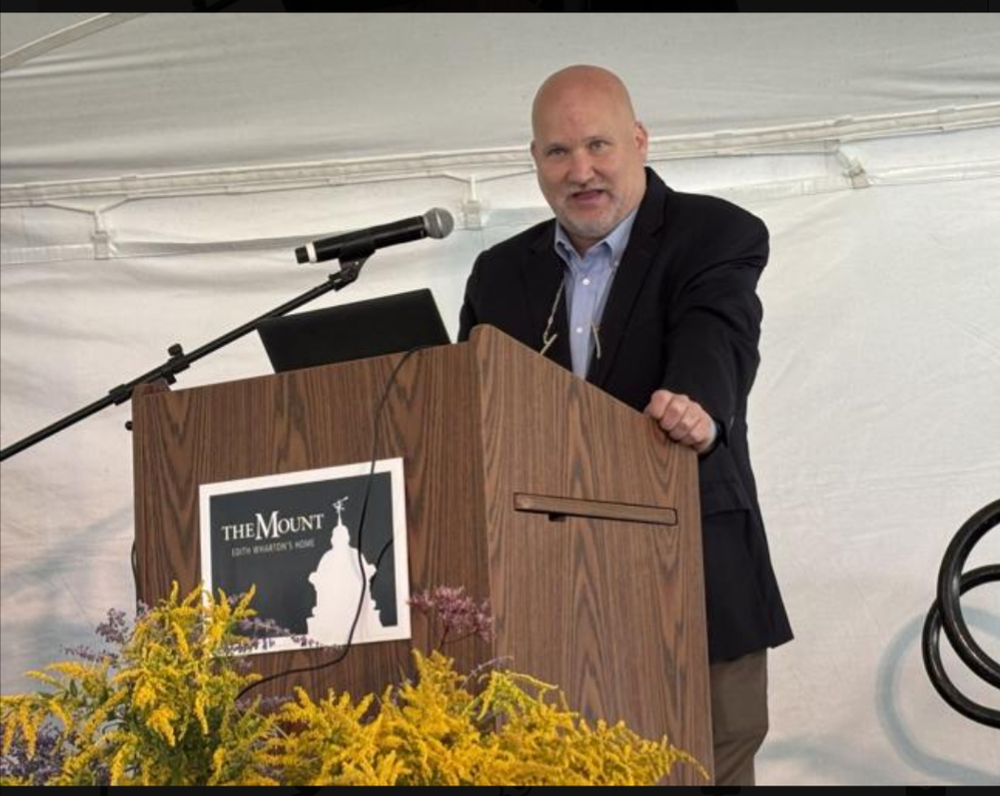by Clarence Fanto Berkshire Eagle August 30, 2025
LENOX — For 165 public school teachers and staffers at the annual school district convocation this week, former state Education Commissioner Jeff Riley offered a strong message about the incoming tidal wave of artificial intelligence.
“I believe we have a choice: We can hold back this tide; we can bury our heads in the sand, or try to surf this wave,” he told the educators gathered Tuesday under a huge tent at The Mount, Edith Wharton’s home.
“You don’t need to know how to surf right now,” he said, “but I’m asking you to dip your toe in the water and just begin. The truth is, AI is already here, every time you try to send a text and it predicts your next word, that’s artificial intelligence. This thing is coming fast and furious. This technology is not perfect, but it can help us.”
Among the pitfalls, he listed voice clones, deep fakes, environmental implications, plagiarism, privacy and data concerns, bias and hallucinations. “It’s only a matter of time before a kid, or a teacher, clones a superintendent’s voice and calls a snow day,” Riley said.
He also warned of kids using deep fakes “to superimpose naked pictures onto some of their classmates, creating a hostile environment. There are also hallucinations, where sometimes the technology makes up answers.”
After six years as commissioner, Riley came out of retirement last year to join MIT’s nonprofit Responsible AI for Social Empowerment and Education, or RAISE, program and its “Day of AI” initiative.
The MIT program trains schools, districts and teachers nationally and internationally how to use the technology safely, crafting policies and building a curriculum to teach AI literacy skills. The goal is “to help students understand the pros and the cons of this technology, what it can do and what it can’t do,” Riley said.
He took the job on a conditional basis: “I wanted to say what I want and be able to speak the truth.” Riley bemoaned the lack of social media regulation for children beginning in 2010.
“We didn’t regulate cellphone use," he pointed out, "and now we have rising rates of anxiety, depression, suicidal ideation because they judge their self-worth based on how many likes they get on TikTok. The research coming out on cellphone use and social media is staggering.”
Riley expressed the hope that “we won’t miss the boat” on regulating AI. “There are amazing things that AI can help us with," he said, "but how do we do it so we keep our kids safe and they’re able to use the technology productively. You have to teach kids to trust but verify, to be healthy skeptics.”
Punctuating his presentation with humor, down-to-earth anecdotes and videos, he listed priorities.
“We know it’s going to be challenging; sometimes kids know more about tech than we do. AI is not going to replace teachers. There are real problems with AI, but at the end of the day, AI might help us start a new revolution in education that can make your lives easier and get back to a focus on instruction and teaching kids.”
He summed up the goal of good teaching. “To put our kids through their paces, when they make a mistake, we pick them up so they can finish the race of life for themselves. If you do that every day, you’re going to get miracles for children, because they’re capable of greatness, regardless of the outcome.”
But Riley also acknowledged that “not everything is easy with children — they can confound you, they can test you, they can try your patience.”
He emphasized that “kids are going to need AI skills, to be competitive in the workforce. Teachers won’t be replaced by AI, but humans with AI skills will probably replace those humans without AI skills. So, the next generation will have to learn this stuff.”
Closing his talk, Riley told the staff: “My friends, you have the most important job in the world, kids can be challenging, but they need you, desperately. We never know what’s happening behind the eyes of a child. Make sure you take care of all of our kids. There’s no disliking kids on company time.”
Ahead of Riley’s presentation, School Committee Chairman Oren Cass noted the coming school year will produce a long-term plan to upgrade Lenox school facilities and a response to technology, including use of personal devices during school days as well as the impact of AI.
Superintendent William Collins told the staff that he aims “to make a difference together” by providing “stability in values and relationships we build with students and families, and stability in support we offer each other as colleagues” during his remaining four school years through June 2029 in the district, leading to the end of his career.
But he stressed that “we must be willing to challenge ourselves, to adapt, to grow because history shows over and over again that organizations that fail to adapt eventually fail.”
Citing the challenges posed by artificial intelligence as “a new frontier,” Collins urged, “Let’s be safe but let’s be bold. Let’s also adapt so that six or 60 convocations from now, our school district will remain as strong, essential and vibrant as it is today.”

